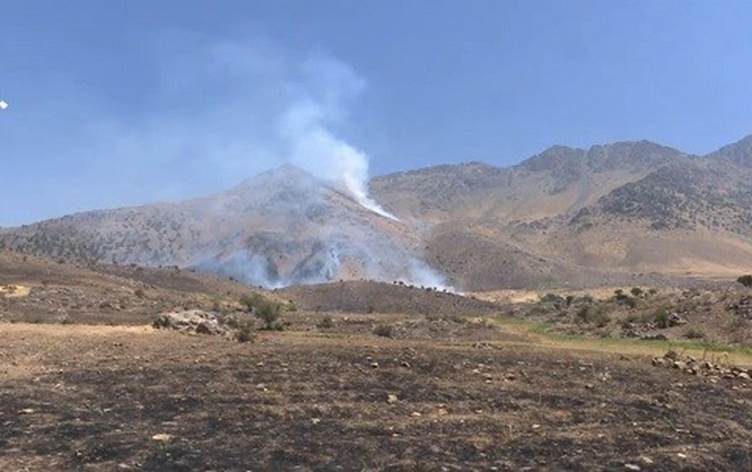HAJI OAMARAN, Kurdistan Region—One civilian and two Peshmerga fighters of the Kurdish rebels opposed to Iran have been injured by Iran’s cross-border shelling into Kurdistan Region’s Balakayati area of Choman town on Monday morning.
“The artillery of the Islamic Republic of Iran have shelled Haji Omaran border areas that includes several villages... on the pretext of the presence of the parties of Rojhelat in the area,” Farzang Ahmad, the commissioner of the Haji Omaran sub-district told Rudaw, referring to Kurdish armed groups from Iranian Kurdistan.
He said that a woman herder has suffered a “minor injury.”
Local police and paramedics could be seen in the area.
Ali Saeed, a Peshmerga commander of Komala told Rudaw that two of their Peshmerga have been injured, adding that the injuries are “minor.”
Video: One of the two Komala Peshmerga fighter who received "minor" injuries in his head in Mondays shelling on the border with Iran, along with his fellow Peshmerga fighters.
The shelling began at 5:00 o'clock in the morning and is continuing, said a Rudaw reporter in the area.
A village chief told Rudaw that as well as artillery, the Iranian security forces used semi-heavy weapons such as DShk.
Earlier in the day, the mayor of Choman, Ahmed Qadir, told Rudaw that the shelling targeted the villages of Kuna Re and Kifarstan.
Ahmad said that it mainly targeted the two villages of Gunda Zhur and Kala Zher, causing some material damage as well.
There are many homes in the area, mainly belonging to Kurdish herders.
A local farmer told Rudaw that it was heavy shelling, causing many to flee, though some stayed behind despite the fear it caused.
“An intensive shelling began targeting the homes of the shepherd and animal farmers,” the local farmer who fled to the nearby town of Choman told Rudaw. “It was very intensive. They bombed the area with nearly 1,000 shells.”
He said that some people were wounded, without giving further details.
Farzang Ahmad, of the Haji Omaran sub-district, said that they have made contact with Iranian authorities through the Kurdish Border Guards to request an end to the shelling, but the Iranians did not respond.
The shelling targets an area where three Kurdish armed groups opposed to Iran are present. They include members of the Iranian Democratic Party of Kurdistan (PDKI or HDKA), Iran's Kurdistan Democratic Party (PDK, HDK), and the Komala party.
Iran has shelled areas inside the Kurdistan Region on several occasions on the pretext of the presence of armed Kurdish groups on its border.
In June last year, five civilians were wounded in attacks near the Iranian border, including three children.
The PDKI, which is considered Iran’s main armed Kurdish party, said in 2015 that it was giving up a two-decade ceasefire with the Iranian government and returning its guerrilla fighters to Iran, but that it would not initiate hostilities unless attacked. They also rejected a request from the Kurdistan Region “to stop armed attacks in Iran,” following rising tensions between Tehran and Erbil over the presence of Kurdish armed groups in the border areas.
Komala, whose three Peshmerga fighters were killed in clashes with Iranian security forces in late June inside Iran, revealed earlier in the year that it had resumed its armed struggle against Iran, becoming the third Kurdish party to do so since 2015.
Komala vowed that they will “avenge” the killings of their Peshmerga, adding that the time is very close to start a comprehensive armed struggle against Tehran.
The party signed an alliance agreement with the PDKI in 2012, a more active armed party. This alliance is reflected in their armed deployment to the mountains.
These parties are now said to be manning a 60-km border with Iran.



Comments
Rudaw moderates all comments submitted on our website. We welcome comments which are relevant to the article and encourage further discussion about the issues that matter to you. We also welcome constructive criticism about Rudaw.
To be approved for publication, however, your comments must meet our community guidelines.
We will not tolerate the following: profanity, threats, personal attacks, vulgarity, abuse (such as sexism, racism, homophobia or xenophobia), or commercial or personal promotion.
Comments that do not meet our guidelines will be rejected. Comments are not edited – they are either approved or rejected.
Post a comment